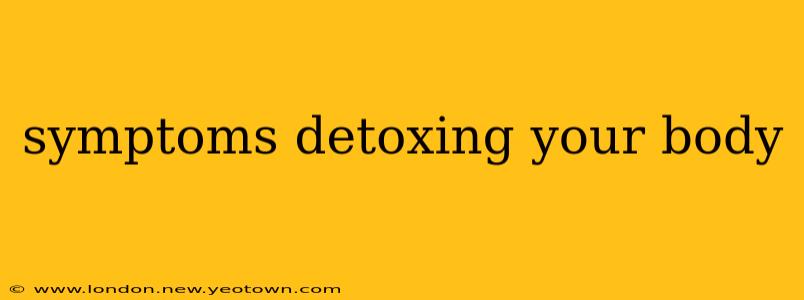Detoxing. The word itself conjures images of vibrant green smoothies, sweat-drenched workouts, and a feeling of profound rejuvenation. But what exactly is detoxing, and what are the telltale signs your body is undergoing this process? It’s a question that's sparked countless conversations, and unfortunately, often clouded by misinformation. Let's unravel the truth behind detox symptoms and explore the holistic picture of bodily cleansing.
First, it’s crucial to understand that your body is a remarkably efficient detox machine. Your liver, kidneys, lungs, and skin constantly filter out toxins. However, modern lifestyles, with their exposure to environmental pollutants, processed foods, and stress, can sometimes overwhelm these natural processes. This is where the concept of supporting your body's natural detoxification pathways comes in – through lifestyle changes rather than relying on quick-fix detox teas or pills.
What are the common symptoms of detoxing?
The symptoms you might experience during a period of focused detoxification (through diet changes, increased water intake, or other lifestyle adjustments) can vary widely depending on the individual and the intensity of the detoxification process. However, some common signs include:
- Increased Fatigue: Feeling tired is often one of the first signs. Your body is working hard to eliminate toxins, and this process requires energy.
- Headaches: Toxin build-up can lead to headaches, especially in the initial stages of detoxification.
- Changes in bowel movements: As your body eliminates toxins, you might experience increased bowel movements, potentially looser stools, or even some mild discomfort. This is because your digestive system is working more actively.
- Skin breakouts: Your skin is one of the body's primary elimination pathways. As your body detoxifies, you might experience temporary breakouts as toxins are released through your pores.
- Muscle aches and pains: This is often a sign of detoxification and is likely the result of the liver and kidneys working hard.
- Increased thirst: This is a sign that your body is working hard to flush out the toxins.
Is nausea a symptom of detoxing?
Nausea and Vomiting During Detox:
Nausea and vomiting can indeed be symptoms during a detoxification process, particularly when significant dietary changes are involved. However, these are not necessarily good signs. While some mild discomfort might be expected, severe nausea and vomiting warrant seeking advice from a healthcare professional. It could indicate an overly aggressive detox approach or an underlying health issue. Always listen to your body and err on the side of caution.
Can you experience mood swings while detoxing?
Mood Swings and Emotional Changes:
Yes, mood swings are a possibility during detoxification. The body’s intricate system of neurotransmitters can be impacted by toxin removal, leading to temporary shifts in mood and energy levels. These changes are often temporary, but managing stress through practices like meditation or yoga can help mitigate them.
What does a detox headache feel like?
The Characteristics of a Detox Headache:
A detox headache is typically characterized by dull aches, rather than the sharp, intense pain of a migraine. They often feel pressure-related and might be accompanied by fatigue and overall malaise. If your headaches are severe or persistent, it’s important to consult a doctor to rule out other potential causes.
How long do detox symptoms last?
Duration of Detox Symptoms:
The duration of detox symptoms varies greatly depending on factors like the individual’s health status, the intensity of the detoxification method, and the presence of underlying health conditions. Symptoms can range from a few days to several weeks. If symptoms persist or worsen, it's essential to consult a medical professional.
Disclaimer: This information is for educational purposes only and should not be considered medical advice. Always consult a healthcare professional before making significant dietary or lifestyle changes, particularly if you have pre-existing health conditions. They can help you create a safe and effective plan tailored to your specific needs.

